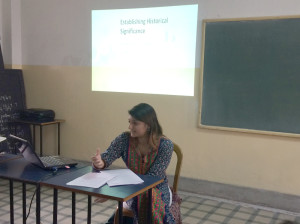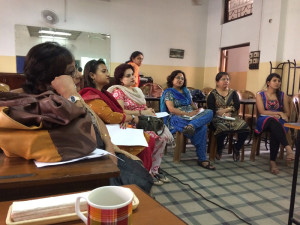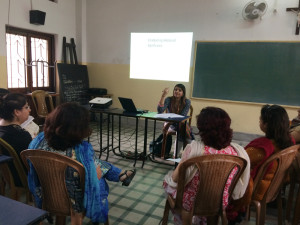Workshop at Teachers Centre, Loreto College, Calcutta. 29.11.2016.
Facilitator: Meher Ali
Participants: 9
A History for Peace event.
‘In our desire to be politically correct and neutral, in our desire to not step on toes, I feel that facts are being lost. How do we counter that? My tussle is that as a teacher I may be forced to be expounding lies, covering up facts as they happened and giving my students a very watered down version of history. I do not believe this is the function of history.’
This is but one example of the concerns that the small group of passionate teachers shared at the Teaching Contested Histories workshop at Teachers Centre, on the afternoon of 29 November 2016.
Participants came from a diverse range of city schools, teaching either English or History in middle or high school. The concerns however were universal: ‘How do we handle sensitive issues?; ‘Lack of time hampers exposure to multiperspectives’; Syllabus does not focus on recent history’, and so on.

Introductions done and concerns shared, Meher began the workshop by asking the teachers if any of them have a discussion with their students on
‘What is history?’
‘What has historical significance?’
“The past is everything that ever happened to anyone anywhere. There is much too much history to remember all of it. So how do we make choices about what is worth remembering? Significant events include those that resulted in great change over long periods of time for large numbers of people. World War II passes the test for historical significance in this sense. But what could be significant about the life of a worker or a slave? What about my own ancestors, who are clearly significant to me, but not necessarily to others? Significance depends upon one’s perspective and purpose. A historical person or event can acquire significance if we, the historians, can link it to larger trends and stories that reveal something important for us today. For example, the story of an individual worker in Winnipeg in 1918, however insignificant in the World War II sense, may become significant if it is recounted in a way that makes it a part of a larger history of workers’ struggles, economic development, or post-war adjustment and discontent. In that case, the ‘insignificant’ life reveals something important to us, and thus becomes significant. Both ‘It is significant because it is in the history book,’ and ‘It is significant because I am interested in it,’ are inadequate explanations of historical significance.”
With these statements Meher built the important link between documented histories and oral histories and how the two when combined can bring multi perspectives and encourage debate, discussion and questioning.
For example while teaching the partition of the sub continent, textbook versions most often depict linear narratives with India portraying it as a war for independence from the British and Pakistan as the birth of the nation state. The framework is that of hero versus villain and victor versus vanquished with no room for debate on circumstantial compulsions. In fact all history in schools is taught as a series of dates and events with governments deciding which dates and events need to be taught.
Meher stressed on the importance of the role of the teacher in breaking this mould and finding new creative ways of imagining alternative histories in the classroom—teaching history in schools in the manner that historians write history. Some of her concrete suggestions towards this end were:
- Approaching history as evidence-based interpretation
- Teaching students about the importance of primary sources and the role and responsibilities of secondary sources
- Using analytic pieces and historical arguments instead of descriptive or summary pieces. Literature can play an important role here.
- Discussing the issue of textbook language. For eg The Indian ICSE history and civics class 10 textbook lists the emergence of the two-nation theory under ‘negative fallouts of the Lucknow pact’ But many, especially Pakistanis, would argue that the two-nation theory is real and valid.
- Discussing the naming of major events. For eg 1971 is referred to in Indian textbooks as the 1971 Bangladesh Liberation War; in Pakistani textbooks as Indo-Pakistan War of 1971 and in Bangladeshi textbooks as Independence War.
Meher had many interesting examples from various textbooks that helped explain the points she was making in great depth and detail.
Next she moved into discussing the importance of continuity and change, and ‘cause’.
Textbooks almost never include causes leading up to an historical event. It is important to focus on this if our students are to acquire a balanced nuanced knowledge of the past. Texbooks and media generally present a single cause for an event, but it is important to explore all the multiple causes that lead up to any event and understand their consequences.
After much discussions on the ‘theory’ of teaching contested histories Meher ended the workshop with concrete suggestions on activities that the teachers could conduct in order to implement all that was discussed.
These included Simulation of historical settings based on topics from the syllabus; Journal Writing; Oral History interviews; Group discussions and debates; Café Canversations with role play; Interpreting Cartoons based on historical events.
The workshop ended with a discussion on the importance of creating a safe space in the classroom for diverse viewpoints to be expressed and respected.
—Megha Malhotra
Meher Ali is a Fulbright research scholar from Brown University, where she completed her BA with honors in history. Her senior thesis, entitled The Hidden Left: Communist Activity in Pakistan, 1948-1951, received the distinguished senior thesis award, as well as the Marjorie Harris Weiss memorial prize and the Samuel Lamport award for promoting international understanding.

